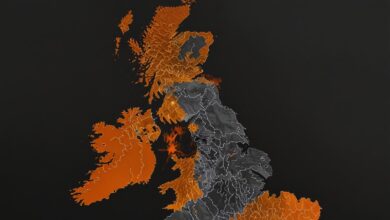Baltic states voice concerns over Russian aggression amid Ukrainian conflict

Ambassadors from Estonia, Lithuania, and Latvia express fears of potential Russian aggression towards them, as the international community, including France, shows increased support for Ukraine amidst the conflict.
In recent developments, heightened concerns emerge amongst the Baltic states, as ambassadors from Estonia, Lithuania, and Latvia express fear over the potential of Russia expanding its aggression towards them following the 2022 invasion of Ukraine. The envoys, in The Sunday Telegraph, drew attention to Russia’s capacity for rapid military action and highlighted the ongoing hybrid attacks they face, urging for heightened vigilance and preparedness. This sentiment is echoed by Estonia’s General Martin Herem, who advocates for a significant increase in defence spending to counter possible Russian incursions effectively.
Concurrently, a somber gathering occurred at Moscow’s Crocus City Hall, with global ambassadors, including from the US and EU, paying tribute to the 144 victims of a tragic attack at a local concert hall, attributed to an Islamic State affiliate. The involvement of Ukraine and the West was insinuated by the Kremlin, a claim denied by Kyiv. Following the attack, arrests were made in Tajikistan and Russia, capturing individuals linked to the incident. The attack, which also injured 551, has instigated a wave of concern among Tajik migrant workers in Moscow, prompting many to return home.
In response to the ongoing conflict in Ukraine, France has pledged substantial military aid, including armored personnel carriers and anti-aircraft missiles, as Ukrainian forces face continued Russian military actions that have severely damaged the country’s energy infrastructure. DTEK, Ukraine’s largest private energy firm, reported an 80% loss in generating capacity due to Russian attacks. Amidst these developments, Paris has announced its stance against the participation of Russian and Belarusian athletes in the upcoming Olympics, aligning with Ukraine’s cause.
French President Emmanuel Macron’s willingness to consider deploying combat forces to support Ukraine has garnered approval from NATO’s frontline states, marking a potential shift in European defence strategies. Macron’s approach, emphasizing strategic ambiguity and a stronger EU role in defence, has begun to mend relations with Baltic states previously wary of France’s stance towards Russia. Concerns, however, remain regarding the practical execution of these proposals and the overall impact on NATO’s dynamics and European security.
The series of events underscore the escalating tensions in Eastern Europe and the international community’s rallying support for Ukraine amidst ongoing Russian aggression, pointing towards a landscape of heightened readiness and diplomatic maneuvering among affected nations and their allies.








